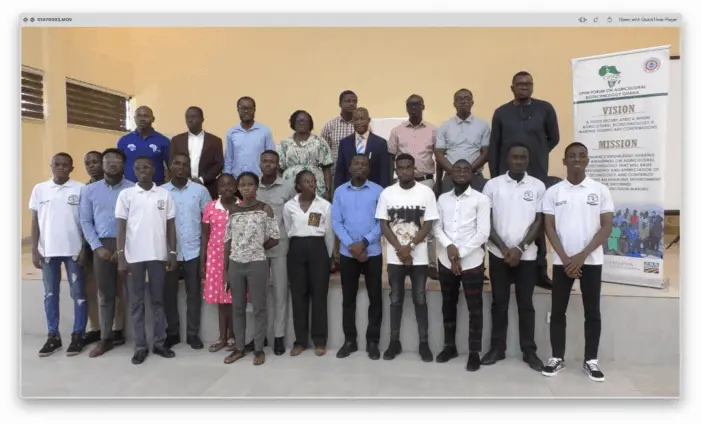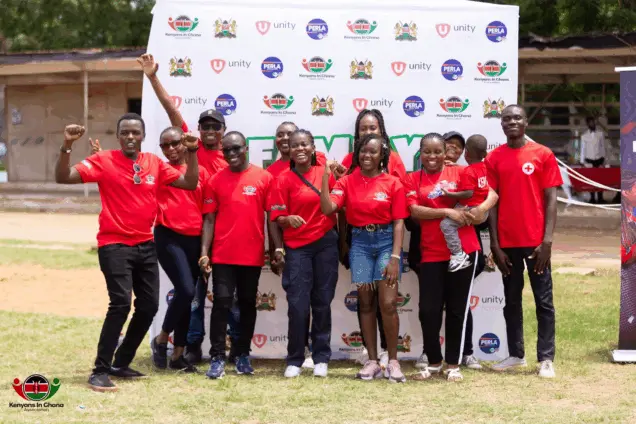In Ghana, where the specter of food insecurity looms large, a growing chorus is calling for bold, innovative solutions to safeguard the nation’s agricultural future. Recent statistics paint a concerning picture, with fluctuating crop yields and increasing reliance on imports threatening the stability of local food systems. Organizations like the Open Forum on Agricultural Biotechnology (OFAB) Ghana are advocating for the embrace of biotechnology as a crucial tool in addressing these challenges.
At a recent OFAB Youth for Biotech Seminar at the University of Cape Coast (UCC), experts and students gathered to discuss the potential of biotechnology to revolutionize Ghana’s agricultural landscape. The seminar underscored a central theme: Ghana faces significant agricultural challenges that necessitate embracing biotechnology and empowering the youth to drive an agricultural revolution, securing the nation’s food future.
The Promise of Biotechnology
Professor Aaron Asare, a leading voice in the field, argues that biotechnology represents the most effective means of boosting food production and ensuring sustainable farming practices. Ghana’s agricultural sector grapples with a multitude of issues, including low crop yields, the overuse of pesticides, and the increasing unpredictability of rainfall patterns. Biotechnology offers pathways to mitigate these challenges through the development of improved crop varieties that are resistant to pests and diseases, reducing the need for harmful chemicals, and withstanding drought conditions.
“Ghana, with its numerous agricultural challenges, has no choice but to embrace biotechnology,” Prof. Asare stated emphatically during the seminar. The potential benefits are far-reaching, promising not only increased yields but also a more environmentally sustainable approach to agriculture.
However, the path to widespread adoption of agricultural biotechnology is not without its obstacles. Misconceptions surrounding the safety of genetically modified (GM) foods persist, fueled in part by earlier negative media coverage. Dr. Daniel Osei Ofosu, a research scientist, addressed these concerns head-on, emphasizing the overwhelming scientific consensus that GM foods pose no harm to human health or the environment.
“GM foods are not harmful to human health or the environment, contrary to popular misconceptions,” Dr. Ofosu asserted, highlighting the need for accurate information and public education to dispel unfounded fears. Overcoming these misconceptions is crucial to fostering acceptance and unlocking the full potential of biotechnology in Ghana.
Empowering the Next Generation
As Ghana warms up to agricultural biotechnology, new opportunities are emerging for students and young professionals. Dr. Daniel Dzidzienyo, a biotechnologist, highlighted the vast career prospects in the field, ranging from research and development to crop consulting and agricultural innovation. “Biotechnology is shaping the future. It offers vast opportunities… The world needs sharp and bold thinkers like you to lead the change,” he declared, urging students to embrace the challenges and opportunities that lie ahead.
Institutions like the West Africa Centre for Crop Improvement (WACCI) are playing a vital role in training the next generation of agricultural scientists, equipping them with the knowledge and skills necessary to drive innovation and address the evolving challenges of food security.
Mrs. Mary Ama Kudom-Agyeman from OFAB Ghana, emphasized the critical role of effective communication in promoting agricultural biotechnology. She called on students to leverage the power of social media to educate the public on the benefits of GM foods, build a critical mass of informed farmers and youth who can champion the technology, and foster a deeper understanding of its potential to transform Ghana’s agricultural landscape. “This is why [OFAB] is committed to building the mindset of a critical mass—especially among farmers and youth—to help them fully benefit from biotechnology,” she stated.
The path to a food-secure future for Ghana hinges on embracing bold thinking, fostering innovation, and empowering the next generation of agricultural leaders. By addressing misconceptions, promoting education, and harnessing the power of biotechnology, Ghana can unlock its agricultural potential and ensure a sustainable and prosperous future for all.
Image Source: MYJOYONLINE









